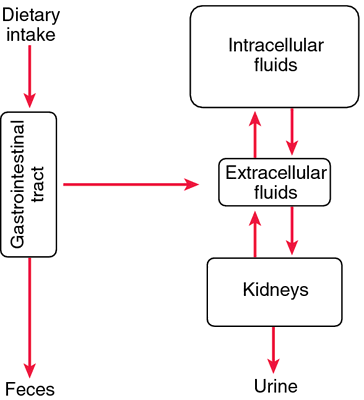potassium
(K) [po-tas´e-um]a chemical element, atomic number 19, atomic weight 39.102. (See Appendix 6.) In combination with other minerals in the body, potassium forms alkaline salts that are important in body processes and play an essential role in maintenance of the acid-base and water balance in the body. All body cells, especially muscle tissue, require a high content of potassium. A proper balance between sodium, calcium, and potassium in the blood plasma is necessary for proper cardiac function.
Since most foods contain a good supply of potassium, potassium deficiency (hypokalemia) is unlikely to be caused by an unbalanced diet. Possible causes include cushing's syndrome (due to an adrenal gland disorder) and fanconi's syndrome (the result of a congenital kidney defect). The cause could also be an excessive dose of cortisone, prolonged vomiting or diarrhea, or thiazide diuretics, which are administered for treatment of hypertension. Signs of potassium deficiency can include weakness and lethargy, rapid pulse, nausea, diarrhea, and tingling sensations.
If the body absorbs enough potassium but the element is not distributed properly, various disorders may develop. Thus an abnormally low content of potassium in the blood may result in an intermittent temporary paralysis of the muscles, known as familial periodic paralysis.
Potassium deficiency can be treated by administration of potassium supplements. There is a large variety of these preparations. Some are liquids, some are powders to be dissolved in liquids, and some are slow-release tablets that dissolve in the intestine. All can cause gastrointestinal irritation. For many persons on diuretic therapy for hypertension, potassium deficiency can be avoided by increasing their consumption of potassium-containing foods, such as bananas, dates, prunes, and raisins, and potassium supplements are not needed. Potassium supplements are never given to patients receiving potassium-sparing diuretics such as amiloride, spironolactone, or triamterene. If the difficulty lies in the body's use of potassium, treatment is concerned with the primary cause of the deficiency.
Since most foods contain a good supply of potassium, potassium deficiency (hypokalemia) is unlikely to be caused by an unbalanced diet. Possible causes include cushing's syndrome (due to an adrenal gland disorder) and fanconi's syndrome (the result of a congenital kidney defect). The cause could also be an excessive dose of cortisone, prolonged vomiting or diarrhea, or thiazide diuretics, which are administered for treatment of hypertension. Signs of potassium deficiency can include weakness and lethargy, rapid pulse, nausea, diarrhea, and tingling sensations.
If the body absorbs enough potassium but the element is not distributed properly, various disorders may develop. Thus an abnormally low content of potassium in the blood may result in an intermittent temporary paralysis of the muscles, known as familial periodic paralysis.
Potassium deficiency can be treated by administration of potassium supplements. There is a large variety of these preparations. Some are liquids, some are powders to be dissolved in liquids, and some are slow-release tablets that dissolve in the intestine. All can cause gastrointestinal irritation. For many persons on diuretic therapy for hypertension, potassium deficiency can be avoided by increasing their consumption of potassium-containing foods, such as bananas, dates, prunes, and raisins, and potassium supplements are not needed. Potassium supplements are never given to patients receiving potassium-sparing diuretics such as amiloride, spironolactone, or triamterene. If the difficulty lies in the body's use of potassium, treatment is concerned with the primary cause of the deficiency.

Homeostatic balance of potassium. Through the functions of resorption and excretion, the kidneys are the best regulator of potassium balance in the extracellular fluids. From Malarkey and McMorrow, 2000.
potassium acetate an electrolyte replenisher and systemic and urinary alkalizer.
potassium bicarbonate an electrolyte replenisher, antacid, and urinary alkalizer.
potassium bitartrate a compound administered rectally as a suppository with sodium bicarbonate to produce carbon dioxide, which promotes defecation by distending the rectal ampulla; administered for relief of constipation, and evacuation of the colon before surgical or diagnostic procedures or childbirth.
potassium chloride a compound used orally or intravenously as an electrolyte replenisher.
potassium citrate a systemic and urinary alkalizer, electrolyte replenisher, and diuretic.
dibasic potassium phosphate the dipotassium salt, K2HPO4; used alone or in combination with other phosphate compounds as an electrolyte replenisher.
potassium gluconate an electrolyte replenisher used in the prophylaxis and treatment of hypokalemia.
potassium guaiacolsulfonate an expectorant.
potassium iodide an expectorant, antithyroid agent, and antifungal.
monobasic potassium phosphate the monopotassium salt, KH2PO4; used as a buffering agent in pharmaceutical preparations and, alone or in combination with other phosphate compounds, as an electrolyte replenisher and urinary acidifier and for prevention of kidney stones.
potassium permanganate a topical antiinfective and oxidizing agent, and an antidote for many poisons.
potassium phosphate a compound combining potassium and phosphoric acid, usually dibasic potassium phosphate.
potassium sodium tartrate a compound used as a saline cathartic.
Miller-Keane Encyclopedia and Dictionary of Medicine, Nursing, and Allied Health, Seventh Edition. © 2003 by Saunders, an imprint of Elsevier, Inc. All rights reserved.
po·tas·si·um bi·tar·trate
a diuretic and laxative.
Synonym(s): cream of tartar, potassium acid tartrate
Farlex Partner Medical Dictionary © Farlex 2012
po·tas·si·um bi·tar·trate
(pŏ-tasē-ŭm bī-tahrtrāt)Medical Dictionary for the Health Professions and Nursing © Farlex 2012